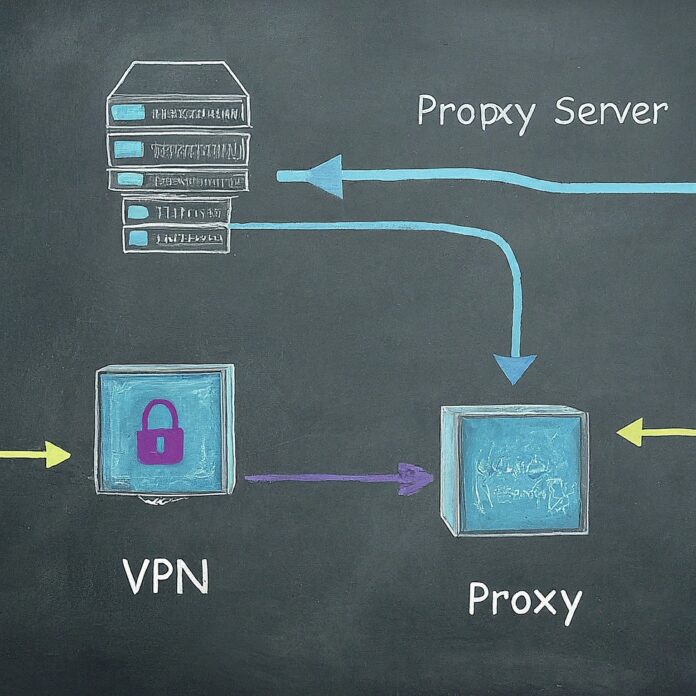Table of Contents
VPN vs. Proxy – the question often arises when seeking online privacy solutions. While both can help obscure your IP address, they differ significantly in how they achieve this. A VPN establishes a secure, encrypted tunnel for all your internet traffic, safeguarding data like passwords and browsing history.
In contrast, a proxy functions like a middleman for a specific app or browser, rerouting traffic but typically lacking encryption. Understanding these nuances is critical to choosing the right tool for your privacy needs.
Regarding protecting your online presence, two frequently discussed tools are VPNs and proxies. Both provide ways to somewhat mask your digital identity, but they operate differently and offer varying levels of security. Let’s dive into their distinctions to make an informed decision.
What is a VPN?
A Virtual Private Network (VPN) creates a secure, encrypted tunnel through which all your internet traffic flows.
Think of it as a super-private highway where your data is hidden from prying eyes like your Internet Service Provider (ISP), hackers, or government surveillance.
VPNs usually work at the operating system level, meaning your entire device gets this protection, not just a single app.
What is a Proxy?
A proxy server acts as an intermediary between your device and the internet.
It masks your IP address, making your web requests appear to originate from the proxy server’s location.
Unlike a VPN, a proxy is generally application-specific, affecting only one browser or service.

VPN vs. Proxy: Key Differences
Encryption: VPNs encrypt your internet traffic, safeguarding your personal information (like logins and passwords) from potential eavesdroppers. Proxies typically lack this encryption layer.
Scope: VPNs work system-wide, securing all the internet data flowing in and out of your device. Most proxies function on a per-application basis.
Speed: Generally, VPNs entail some overhead due to the encryption process, which impacts internet speeds. Proxies can be faster, but this depends on their quality.
Cost: Reliable VPNs tend to be paid services. There are free proxy options, but they often come with restrictions or privacy concerns.
When to Use a VPN
VPNs are your best bet when you need these advantages:
Strong Privacy: If online anonymity and security are paramount, a VPN is the way to go.
Accessing Geo-Blocked Content: VPNs can make it seem like you’re in a different location, letting you bypass regional restrictions on streaming services or websites.
Secure Public Wi-Fi: Public hotspots are notorious for their security risks. A VPN encrypts your traffic, making it harder for snoopers to eavesdrop on your online activities.
When to Use a Proxy
Proxies can be helpful for less-sensitive needs:
Hiding Your IP Address: A proxy might suffice if you want an essential way to mask your IP address for casual web browsing.
Bypassing Simple Content Filters: Proxies can sometimes get you around basic website blocks based on location.
VPN Services
- NordVPN: Highly popular for its strong security, vast server network, and speed. Offers features like double VPN and obfuscated servers for extra privacy.
- ExpressVPN: Emphasizes user-friendly apps, blazing-fast speeds, and a strong reputation for reliability. Excellent for bypassing geo-restrictions on streaming content.
- Surfshark: Offers unlimited simultaneous device connections, making it a great value choice, particularly for families or those with many devices.
- ProtonVPN: Focuses on privacy, featuring a strict no-logs policy and secure core servers that route traffic through multiple locations.
- Mullvad VPN: Prioritizes anonymity, accepting payment methods like cryptocurrency and requiring minimal personal information upon signup.
Proxy Services
- Bright Data (formerly Luminati): Leading provider of residential proxies, meaning your traffic appears like it’s coming from real home internet connections. Ideal for tasks requiring a solid appearance of legitimacy, such as web scraping.
- Smartproxy: Offers a mix of residential and data center proxies, providing flexibility for different use cases.
- Oxylabs: It specializes in high-quality proxies and data scraping tools that are often used by businesses.
- KProxy: Provides a browser extension for a quick and straightforward proxy solution suitable for casual needs but with less security than dedicated proxy or VPN services.
Important Considerations:
- Free vs. Paid: There are free VPNs and proxies, but these often heavily limit bandwidth, have security concerns, or may even log your data. Paid services usually offer better speed and reliability.
- Location: Where a provider has servers matters if you’re focused on accessing certain geo-blocked content.
- Features: Consider extra features like split-tunneling for VPNs or rotating IPs for proxies if those align with your specific needs.
Disclaimer: I haven’t personally tested every provider on this list. Doing your own research and utilizing free trials when possible before committing to any service is essential.
Key Takeaways VPN vs. Proxy
For most people who take online security seriously, a VPN is a superior choice due to its comprehensive encryption, whole-device protection, and ability to enhance privacy across all internet activity. Proxies can serve a purpose in specific, less security-critical use cases, but their limited scope and lack of encryption make them a less robust privacy solution.


